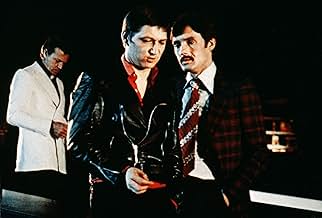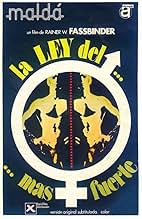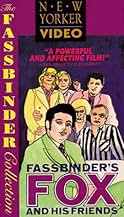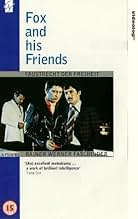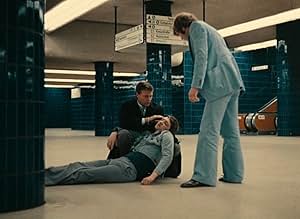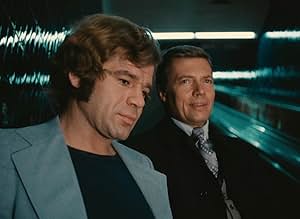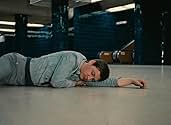IMDb RATING
7.6/10
7.3K
YOUR RATING
A suggestible working-class innocent wins the lottery but lets himself be taken advantage of by his bourgeois new boyfriend and his circle of materialistic friends.A suggestible working-class innocent wins the lottery but lets himself be taken advantage of by his bourgeois new boyfriend and his circle of materialistic friends.A suggestible working-class innocent wins the lottery but lets himself be taken advantage of by his bourgeois new boyfriend and his circle of materialistic friends.
- Director
- Writers
- Stars
- Awards
- 1 win total
Karlheinz Böhm
- Max
- (as Karl-Heinz Böhm)
Harry Baer
- Philip
- (as Harry Bär)
Karl-Heinz Staudenmeyer
- Krapp
- (as Karl Heinz Staudenmeier)
Marquard Bohm
- American Soldier
- (as Marquart Bohm)
- Director
- Writers
- All cast & crew
- Production, box office & more at IMDbPro
Featured reviews
Rainer Werner Fassbinder has long been honored as the 'bad boy' in European cinema, a writer/director/actor who repeatedly has taken chances and because of his brutal honesty has succeeded in making a stream of important films. FOX AND HIS FRIENDS dates back to 1975 and remains one of Fassbinder's most successful films. As with all of his films, Fassbinder deals with the homosexual subculture in Germany but his main message goes far beyond the characters he creates: the examination of how people manipulate people for personal gain and the destruction that produces is a recurring problem and one that this film certainly explores.
'Fox' - a nickname of Franz Bieberkopf - (acted with consummate skill by Fassbinder himself) is a lower class gay carny kid whose lover is arrested, leaving the carnival to collapse and leaving Fox without support. Enter handsome Max (Karlheinz Böhm), a wealthy antiques dealer, who picks up Fox, helps him buy the requisite 'lottery ticket' on which Fox bases his hopes for financial survival (!) via manipulative means, and takes him home, introducing Fox to his gay friends who regard Fox as scum but show obvious physical attraction to his rawness. Surprisingly Fox wins the lottery and suddenly has 500,000 DMs and with his new money, Max's friends abruptly see a target for obtaining that money. One of the friends named Eugen (Peter Chatel) takes Fox in as a lover and talks him into investing in Eugen's family business of bookbinding. Eugen's father Wolf (Adrian Hoven) and mother (Ulla Jacobsson) tolerate their son's life with a low class wretch, ridiculing his manners and lack of culture and education, but willingly take his money to salvage their business.
With a lover and a business and a role model to make him suave, Fox dons fancy clothes, banters with his old friends in a tawdry club, and makes the pretenses that at last he is secure and happy. But in time Fox is blamed for problems at the business and when his funds have been depleted on expensive vacations and apartments by the smarmy self-centered Eugen, Fox realizes that now without money he has no 'fancy friends', no lover, no security and his life becomes unbearable: the ending to the film is a tragedy beyond description.
Some would say the film is mannered in ways that depict stereotypes of the gay world (effeminate men, transvestites, opportunists, hustlers, etc), but Fassbinder is completely honest in his attempt to recreate a subculture of a specific time in Germany. And the characters are well written and well acted allowing us to look at Fassbinder's greater picture of depravity between social class antipathies. In many ways this is a difficult film to watch, but Fassbinder wisely places the main character whom he enacts in a place where his foibles and lack of higher class knowledge can be at once very humorous as well as pitiable. FOX AND HIS FRIENDS has some minor flaws but it has already become a classic in gay cinema repertoire. In German with English subtitles. Grady Harp
'Fox' - a nickname of Franz Bieberkopf - (acted with consummate skill by Fassbinder himself) is a lower class gay carny kid whose lover is arrested, leaving the carnival to collapse and leaving Fox without support. Enter handsome Max (Karlheinz Böhm), a wealthy antiques dealer, who picks up Fox, helps him buy the requisite 'lottery ticket' on which Fox bases his hopes for financial survival (!) via manipulative means, and takes him home, introducing Fox to his gay friends who regard Fox as scum but show obvious physical attraction to his rawness. Surprisingly Fox wins the lottery and suddenly has 500,000 DMs and with his new money, Max's friends abruptly see a target for obtaining that money. One of the friends named Eugen (Peter Chatel) takes Fox in as a lover and talks him into investing in Eugen's family business of bookbinding. Eugen's father Wolf (Adrian Hoven) and mother (Ulla Jacobsson) tolerate their son's life with a low class wretch, ridiculing his manners and lack of culture and education, but willingly take his money to salvage their business.
With a lover and a business and a role model to make him suave, Fox dons fancy clothes, banters with his old friends in a tawdry club, and makes the pretenses that at last he is secure and happy. But in time Fox is blamed for problems at the business and when his funds have been depleted on expensive vacations and apartments by the smarmy self-centered Eugen, Fox realizes that now without money he has no 'fancy friends', no lover, no security and his life becomes unbearable: the ending to the film is a tragedy beyond description.
Some would say the film is mannered in ways that depict stereotypes of the gay world (effeminate men, transvestites, opportunists, hustlers, etc), but Fassbinder is completely honest in his attempt to recreate a subculture of a specific time in Germany. And the characters are well written and well acted allowing us to look at Fassbinder's greater picture of depravity between social class antipathies. In many ways this is a difficult film to watch, but Fassbinder wisely places the main character whom he enacts in a place where his foibles and lack of higher class knowledge can be at once very humorous as well as pitiable. FOX AND HIS FRIENDS has some minor flaws but it has already become a classic in gay cinema repertoire. In German with English subtitles. Grady Harp
Man has mastered the art of wielding Power. Show him an inch and he will become your slave, give him an inch and he will become your master. And you watch while he takes the whole nine yards around your hearth & eventually your gravestone as well. Fox and his Friends resonates many themes from Ali: Fear eats the Soul, Fassbinder's soothing, Melancholic masterwork. In 'Ali' the protagonists Emi and Eli literally dance into each other's arms whereas in Fox Eugen and Fox clash and spar with unabashed animal magnetism. Franz Bieberkopf a.k.a Fox is a variety show entertainer named The Speaking Head. He is an "abnormal on an Itinerant stage," as one line introduces us to him. His lover is arrested, the show is packed off and so is Fox, who is too polite and cowardly to remonstrate the Manager's unfairness. A latter line alludes to Fox being picked up from a "pubic urinal." 'Fox and Friends' is unapologetic and brutal in its portrayal of Sexual Politics and Power Equations. That it bases its premise on homosexuality is a moot point. What the mood of the film conveys or what the acting styles convey is a hopeless, recursive, silent Machinery laughing away at genuine peoples efforts to wriggle out. Fox's luck changes after an escapade he engineers. His singular belief in winning a lottery drives him to the deed though he is initially mugged after he legally borrows an amount. Fox is picked up by an aristocratic gent named Max. This brief scene is memorable for the three lightning edit cuts and freeze frames that show a rendezvous being established through codes and signals.
Fox is introduced to Max's friends and is promptly attracted to and simultaneously repulsed by Eugen Thiess, a vain and ambitious bourgeois upstart. These are probably Fox's most liberating moments; when his street gab and penny tricks help him parry Eugen's sarcasm. But these defenses are soon exhausted when Fox's limitations loom large. He is ugly, poor, unschooled and "unskilled," as Eugen later points out. He is a homosexual from the streets. He will find no sympathy in a society that compels one to find power and to use it. His "proletariat potency," he knows is transient and viewed as a natural disposition to "boozing, scoffing and screwing." Eugen is an opportunistic entrepreneur who is quick to move in on Fox's vulnerability to acquire all the trappings that will win him society's approval.
The editing here has amaelstrom like effect; events unspooling at a breathless pace, sharply contrasting the layers being peeled off Max's slight persona. Eugentactfully manipulates Fox as he climbs the social ladder, rescuing a family business and acquiring tasteful 'possessions.' Fox is useful for as long as he has the prize money. Eugen's family is respectful to Fox when in need but quickly change colors when tides change. Fassbinder casts himself as Franz and his interpretation of the role is pitch perfect. Peter Chatel is suitably stoic as Eugen, the scheming lover. I could sense an icy chillness each time Karlheinz Bohm appeared on screen. It was no small surprise when my rusty memory discovered that my only introduction to his work was in Michael Powell's icy, voyeuristic 'Peeping Tom.' Bohm as Max the antiques dealer infuses a chilling, menacing air to his character. Intermittent and lurking, he lands up at important intervals in Fox's journey. Michael Ballhaus' (also a Kubrick and Scorsese regular) camera-work has a languid dexterity that together with Fassbinder's frames create moments of lingering pathos. Filters and geometrical motifs accentuate the fractured personalities and hollowness of meaningless lives. The contributions of other characters lend a dramatic weight to the final act of betrayal – the stampede of the Herd. Two performances merit special mention; Hans Zander as the snide barman Springer and Peter Kern as the lecherous florist 'Fatty' Schmidt. The subject matter of the film created a huge controversy upon release. Fassbinder was accused of being homophobic despite being openly homosexual. There are some nude male frontal scenes that have never been depicted so openly since. Some frames depict young boys as Adonis like props, objectified for sexual predators or as mute adornments in depraved Saturnalia. In one telling scene Fox blocks out the reflection of a nude boy to prevent Eugen from looking on. In a polarized world Fox is easy meat, even for the weakest of predators. His body is the only commodity he can sell and as Eugen explains " Fox is not the kind of guy money can make rich."
With 'Ali,' Fassbinder floored me. With 'Fox' he has me hooked for life. My personal rating- 7.8/10
Fox is introduced to Max's friends and is promptly attracted to and simultaneously repulsed by Eugen Thiess, a vain and ambitious bourgeois upstart. These are probably Fox's most liberating moments; when his street gab and penny tricks help him parry Eugen's sarcasm. But these defenses are soon exhausted when Fox's limitations loom large. He is ugly, poor, unschooled and "unskilled," as Eugen later points out. He is a homosexual from the streets. He will find no sympathy in a society that compels one to find power and to use it. His "proletariat potency," he knows is transient and viewed as a natural disposition to "boozing, scoffing and screwing." Eugen is an opportunistic entrepreneur who is quick to move in on Fox's vulnerability to acquire all the trappings that will win him society's approval.
The editing here has amaelstrom like effect; events unspooling at a breathless pace, sharply contrasting the layers being peeled off Max's slight persona. Eugentactfully manipulates Fox as he climbs the social ladder, rescuing a family business and acquiring tasteful 'possessions.' Fox is useful for as long as he has the prize money. Eugen's family is respectful to Fox when in need but quickly change colors when tides change. Fassbinder casts himself as Franz and his interpretation of the role is pitch perfect. Peter Chatel is suitably stoic as Eugen, the scheming lover. I could sense an icy chillness each time Karlheinz Bohm appeared on screen. It was no small surprise when my rusty memory discovered that my only introduction to his work was in Michael Powell's icy, voyeuristic 'Peeping Tom.' Bohm as Max the antiques dealer infuses a chilling, menacing air to his character. Intermittent and lurking, he lands up at important intervals in Fox's journey. Michael Ballhaus' (also a Kubrick and Scorsese regular) camera-work has a languid dexterity that together with Fassbinder's frames create moments of lingering pathos. Filters and geometrical motifs accentuate the fractured personalities and hollowness of meaningless lives. The contributions of other characters lend a dramatic weight to the final act of betrayal – the stampede of the Herd. Two performances merit special mention; Hans Zander as the snide barman Springer and Peter Kern as the lecherous florist 'Fatty' Schmidt. The subject matter of the film created a huge controversy upon release. Fassbinder was accused of being homophobic despite being openly homosexual. There are some nude male frontal scenes that have never been depicted so openly since. Some frames depict young boys as Adonis like props, objectified for sexual predators or as mute adornments in depraved Saturnalia. In one telling scene Fox blocks out the reflection of a nude boy to prevent Eugen from looking on. In a polarized world Fox is easy meat, even for the weakest of predators. His body is the only commodity he can sell and as Eugen explains " Fox is not the kind of guy money can make rich."
With 'Ali,' Fassbinder floored me. With 'Fox' he has me hooked for life. My personal rating- 7.8/10
I'm continually blown away with Fassbinder. And it's all the more affecting because, like all great artists, he challenges your conceptions and forces you to have a new experience. We have to fight our way through his movie, critiquing everything we see. Fox is sure he will win the lottery. Today will be the day. And, he does. Like the ending of "Ordet," this is a cliché embraced, but why? Fassbinder is far too intelligent and original a talent to be conventional without a reason. (In fact, in a regular movie Fox's lottery win would be a thrilling set-piece, sitting in front of a TV screen in a living room, with some dying family member in a hospital bed awaiting money for treatment. Here, we don't even see the win.) Of course the lottery win is a set-up for the way money affects a relationship, especially in gay culture.
Basically, Fassbinder is truth. There's a much more honest depiction of factory work here than in, say, von Trier's later films, where he dotes on the "common" man (just as often, woman) as if a simpleton that we should feel sorry for (I doubt they feel sorry for themselves; von Trier just obliges us to feel that way on their behalf). The mistakes made here are by the controllers of the factory -- it's Fox's scheming lover's father who gets the business bankrupt, and it's Fox, after he lends his lover money to get them out of debt, who screws up the printing. But Fox isn't humiliated by his mistake, whereas a blind, helpless Bjork in "Dancer in the Dark" is made to be a pitiable object. (To be fair, both Fassbinder and von Trier have a tendency to wallow in the miserable.)
Fassbinder focuses his film mainly on the class barrier -- Fox's lover makes insulting comments to him regarding proper manners -- but he's also giving us a kind of gay relationship film noir -- we see ex-lovers kissing (in a ceiling mirror!) behind current lovers' backs, and money corruption plays a large part in the film. (Fox's lover is excellent in his role; he never plays a character who's sole purpose for living is to plot in a corner about how he'll be evil today.) And Fassbinder's view of society as something that destroys people is very noirish (Fox isn't completely in the dark; he does understand he's being used as it's happening). But to be sure, Fassbinder is also detailing the upper-class homosexual in a very critical way; but I think he could have done much more exposing the shallowness of gay culture. (He mainly treats Fox's lover and his ex-/secret lover with peeking-through-keyhole disdain, no doubt partly from Fox's perspective, but I find that somewhat childish and not terribly interesting. It's the view of someone who's been screwed over and feels depressed about it, not someone intent on exposing why people are corrupt, and how.) You don't know quite how to feel about this; in a way Fassbinder is very brave -- he casts himself in an incredibly unromantic role. And at the same time it's interesting because, while Fassbinder doesn't seem too pleased with the superficial manner of the gays whose eyes immediately fixate on money and looks, his own film features an abundance of male nudity early on, of young, very attractive boys that Fox himself is quite attracted to.
On a more technical aspect, there are plenty of interesting shots, of reflections, or obscurities, or of the backs of heads or bodies; one particularly stand-out scene is the one where Fox and his lover are vacationing in Morocco and cruise for a man, and when in a taxi with him the camera observes the festival around them while we listen to their discussion. (The man they pick up is Ali from "Fear Eats the Soul," and many of Fassbinder's stable appear in the film. The fact that it's Ali playing a Moroccan -- albeit, one that's ostensibly gay, so it may not in fact be Ali -- gives the film a self-referential bent, though it's never gimmicky; rather, a continuous web of obsessions; there is a comment on racism inputted in this scene, as well.) The ending of the film is a bit too cruel and heavy-handed, though the pessimist in me appreciates it, the part of me that believes society is a pitiless social system out to wreck anything with a pureness of soul. 9/10
Basically, Fassbinder is truth. There's a much more honest depiction of factory work here than in, say, von Trier's later films, where he dotes on the "common" man (just as often, woman) as if a simpleton that we should feel sorry for (I doubt they feel sorry for themselves; von Trier just obliges us to feel that way on their behalf). The mistakes made here are by the controllers of the factory -- it's Fox's scheming lover's father who gets the business bankrupt, and it's Fox, after he lends his lover money to get them out of debt, who screws up the printing. But Fox isn't humiliated by his mistake, whereas a blind, helpless Bjork in "Dancer in the Dark" is made to be a pitiable object. (To be fair, both Fassbinder and von Trier have a tendency to wallow in the miserable.)
Fassbinder focuses his film mainly on the class barrier -- Fox's lover makes insulting comments to him regarding proper manners -- but he's also giving us a kind of gay relationship film noir -- we see ex-lovers kissing (in a ceiling mirror!) behind current lovers' backs, and money corruption plays a large part in the film. (Fox's lover is excellent in his role; he never plays a character who's sole purpose for living is to plot in a corner about how he'll be evil today.) And Fassbinder's view of society as something that destroys people is very noirish (Fox isn't completely in the dark; he does understand he's being used as it's happening). But to be sure, Fassbinder is also detailing the upper-class homosexual in a very critical way; but I think he could have done much more exposing the shallowness of gay culture. (He mainly treats Fox's lover and his ex-/secret lover with peeking-through-keyhole disdain, no doubt partly from Fox's perspective, but I find that somewhat childish and not terribly interesting. It's the view of someone who's been screwed over and feels depressed about it, not someone intent on exposing why people are corrupt, and how.) You don't know quite how to feel about this; in a way Fassbinder is very brave -- he casts himself in an incredibly unromantic role. And at the same time it's interesting because, while Fassbinder doesn't seem too pleased with the superficial manner of the gays whose eyes immediately fixate on money and looks, his own film features an abundance of male nudity early on, of young, very attractive boys that Fox himself is quite attracted to.
On a more technical aspect, there are plenty of interesting shots, of reflections, or obscurities, or of the backs of heads or bodies; one particularly stand-out scene is the one where Fox and his lover are vacationing in Morocco and cruise for a man, and when in a taxi with him the camera observes the festival around them while we listen to their discussion. (The man they pick up is Ali from "Fear Eats the Soul," and many of Fassbinder's stable appear in the film. The fact that it's Ali playing a Moroccan -- albeit, one that's ostensibly gay, so it may not in fact be Ali -- gives the film a self-referential bent, though it's never gimmicky; rather, a continuous web of obsessions; there is a comment on racism inputted in this scene, as well.) The ending of the film is a bit too cruel and heavy-handed, though the pessimist in me appreciates it, the part of me that believes society is a pitiless social system out to wreck anything with a pureness of soul. 9/10
In "Fox and His Friends" (1975) which Rainer Werner Fassbinder wrote and directed, he played a main character, Franz Bieberkopf alias "Fox", a lower class, uneducated circus worker who loses his job when his lover, the circus owner is arrested and sent to prison for tax fraud. Fox believes in his luck and strikes it rich by winning 500,000 marks in the lottery and very soon attracts the attention of an elegant, posh, and sophisticated Eugen who knows very well how to make Fox pay for his expensive habits and how to make him invest a lot of money in his father business that is not very successful to say the least. What fascinated me the most - how convincingly Fassbinder - one man production company who came up with the idea, wrote the screenplay and directed the movie- played seemingly tough but as it turned, confused and vulnerable Fox. Another interesting aspect of the movie is the way Fassbinder describes the gay community in Germany of the early 70s. He does not make any excuses and he does not make his characters complete villains or innocent victims. The story he tells could've happened in any community.
Fox and his Friends caused some controversy when it was first made - it was thought that this story of a gay sideshow worker who wins the lottery, only to be exploited to the hilt by his upper-class lover, was potentially homophobic. Fassbinder himself commented that the story could have been about a heterosexual relationship, but it wouldn't have been as clear.
Fassbinder himself plays Fox - the burly ugly duckling of German cinema miraculously slimmed down, looking almost handsome. Fox's street skills and good humour are undercut by his naivety, as his repellently snobbish boyfriend systematically scams him out of the thousands of marks he's won on the lottery. The story proceeds with ruthless inevitability, as Fox becomes more and more demoralised. Yet the film contains some of Fassbinder's sharpest comedy, particularly in a brilliantly embarrassing dinner party scene. RWF is excellent in the title role; amazing to think that the guy who wrote and directed the film (among so many others) could play a good-natured dimwit with such conviction.
Fassbinder himself plays Fox - the burly ugly duckling of German cinema miraculously slimmed down, looking almost handsome. Fox's street skills and good humour are undercut by his naivety, as his repellently snobbish boyfriend systematically scams him out of the thousands of marks he's won on the lottery. The story proceeds with ruthless inevitability, as Fox becomes more and more demoralised. Yet the film contains some of Fassbinder's sharpest comedy, particularly in a brilliantly embarrassing dinner party scene. RWF is excellent in the title role; amazing to think that the guy who wrote and directed the film (among so many others) could play a good-natured dimwit with such conviction.
Did you know
- TriviaThe normally overweight Rainer Werner Fassbinder dieted strenuously to lose weight in order to play the role of Fox, which included a full-frontal nude scene.
- GoofsOne character mentions that one could receive money from the city for collecting June bugs (May beetles, genus Phyllophaga) as children. In reality, children were paid for collecting Colorado potato beetles (Leptinotarsa decemlineata), an invasive species.
- How long is Fox and His Friends?Powered by Alexa
Details
- Release date
- Country of origin
- Official sites
- Languages
- Also known as
- La ley del más fuerte
- Filming locations
- Petersplatz, Munich, Bavaria, Germany(clock tower)
- Production companies
- See more company credits at IMDbPro
Box office
- Budget
- DEM 450,000 (estimated)
- Gross US & Canada
- $8,144
- Opening weekend US & Canada
- $11,623
- Feb 16, 2003
- Gross worldwide
- $8,158
- Runtime
- 2h 4m(124 min)
- Sound mix
- Aspect ratio
- 1.37 : 1
Contribute to this page
Suggest an edit or add missing content

